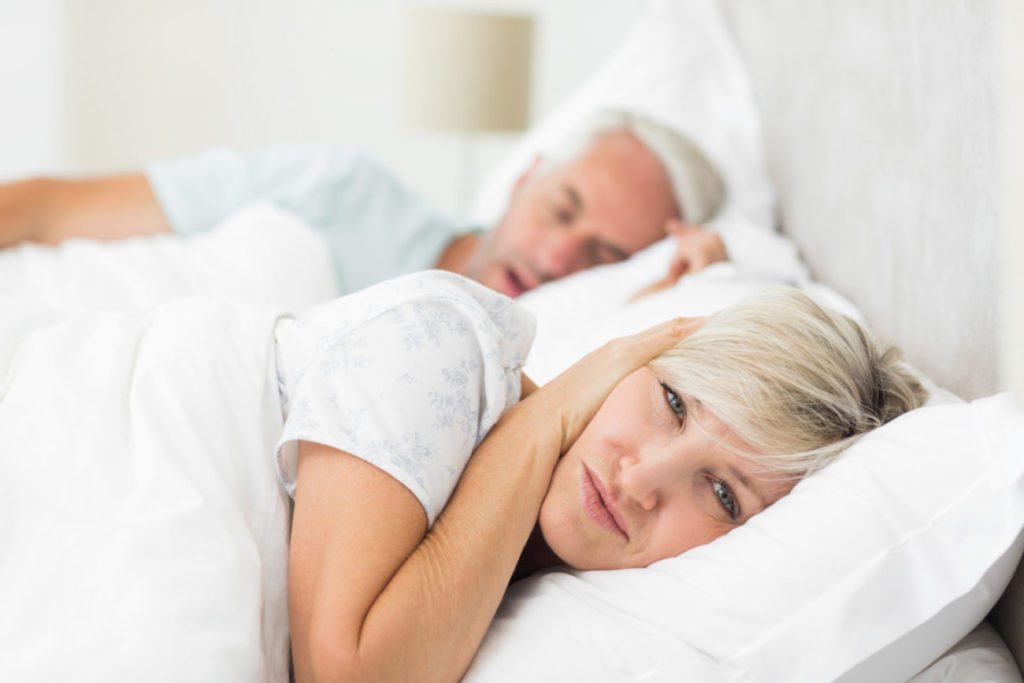Millions of Americans snore for a variety of reasons. In some cases, simple lifestyle changes can prevent or lessen snoring. These remedies include sleeping on your side instead of on your back, avoiding alcohol and sedatives at bedtime, and maintaining a healthy body weight.
For others, snoring is an indication of a more serious sleep disorder known as sleep apnea. Those who suffer from obstructive sleep apnea (OSA) actually stop breathing repeatedly during their sleep because of a blockage in the airway.
Generally, blockage is caused by a collapse of the soft tissue in the back of the mouth or throat. Dr. Robert Gauthier treats snoring and sleep apnea as a health concern in Northborough, MA. He can provide oral appliances for patients with mild to moderate sleep apnea.

Risk Factors for Sleep Apnea
There are many risk factors that have been proven to increase the risk of developing sleep apnea. People who drink, smoke, and/or use sedatives are known to suffer from sleep apnea. It is also often worse in patients who are pregnant, overweight, or obese or use drugs.
This sleep disorder is known to be more prominent as people age. It is estimated that as many as 50% of the elderly population suffer from it. If you have a family history of OSA, have a narrow airway or small lower jaw, you also have a higher risk of developing sleep apnea.
Symptoms of Sleep Apnea
Diagnosing a sleep disorder will involve more than just your dentist. Your physician and Dr. Gauthier will work together to help you get diagnosed and treated for your snoring and sleep apnea. You will most likely need to undergo sleep testing to get an accurate diagnosis.
X-rays and exams will also look for signs of a blockage in your airway. Most importantly, your medical team will review your medical history and discuss your symptoms. Common signs of a sleep disorder include:
- Waking up with a sore or dry throat
- Loud snoring
- Waking during the night gasping for air
- Daily lethargy after a full nights rest
- Morning headaches
- Forgetfulness
- Mood changes
Left untreated sleep apnea can lead to an increased risk of major systemic health concerns. Patients with sleep apnea are more prone to diabetes, stroke, and heart attacks, among other ailments.
If you believe that you or a loved one may have sleep apnea, contact your doctor as soon as possible. While Dr. Gauthier is unable to diagnose obstructive sleep apnea (OSA), he will work with your physician or sleep specialist to help you through the process of getting a diagnosis.
Sleep Apnea Appliance

Dr. Gauthier treats sleep apnea patients using SomnoDent®, an oral appliance therapy. The SomnoDent oral appliance is custom made to be comfortable and discreet, the purpose of which is to keep the airway open by repositioning the jaw and tongue, preventing a collapse from occurring.
SomnoDent treatment has also been shown to have a clinically significant impact in reducing patients’ blood pressure and has been predicted to reduce the risk of stroke. In addition, this blood pressure reduction was apparent in the early morning, which is the time of peak risk for a heart attack.
Snoring and Sleep Apnea FAQs
Sleep apnea is a serious problem if left untreated. Read the answers to these commonly asked questions to learn more.
What’s the relationship between snoring and sleep apnea?
Snoring can be something that’s just a solo issue, or it can be an indicator of sleep apnea. However, the most reliable indicator of sleep apnea is gasping or choking in the middle of the night while sleeping. As for snoring, it isn’t always an indicator of sleep apnea. It’s important to look for other symptoms if snoring is the only thing you’ve noticed.
Does a sleep apnea snore sound different?
There are a few things that make a sleep apnea snore sound differently. Instead of being an even, consistent rhythm, the sounds of sleep apnea snoring gradually ramp up and become louder. They also become higher-pitched as the airway becomes more obstructed. Often, the snoring will end in a snort or choking cough before starting again when you fall back into a deep sleep.
Does sleep apnea go away on its own?
No, and that’s one of the big dangers of sleep apnea. Many people think that it’s just snoring and often aren’t worried about it. The condition continues to get worse, increasing the likelihood of you developing severe side effects and symptoms. These include high blood pressure and an increased risk of heart attacks and strokes.
What aggravates sleep apnea?
Sleep apnea worsens when you sleep on your back, as it encourages the soft tissue in your throat to collapse and block your airway. You’re also more likely to suffer from sleep apnea if you’re obese or older, as our tissue slackens with age. Certain prescription medicines and alcohol also aggravate it. These are also relaxants and encourage tissue collapse.
Does sleep apnea happen every night?
Usually, even if you don’t realize it, it’s occurring every night. Even if you don’t fully wake yourself up during the night, your sleep still gets disrupted. This is why morning headaches and extreme sleepiness are indicators. You may think that you’re getting a good night’s sleep, but you aren’t actually rested.
When should I be worried about snoring?
Once your snoring impacts your sleep and daily life, it’s time to contact your dentist for options. They include waking yourself up in the middle of the night with breathing problems, severe daytime sleepiness, irritability, morning headaches, or restless sleep. If your snoring is waking up your partner, that also indicates an issue.
